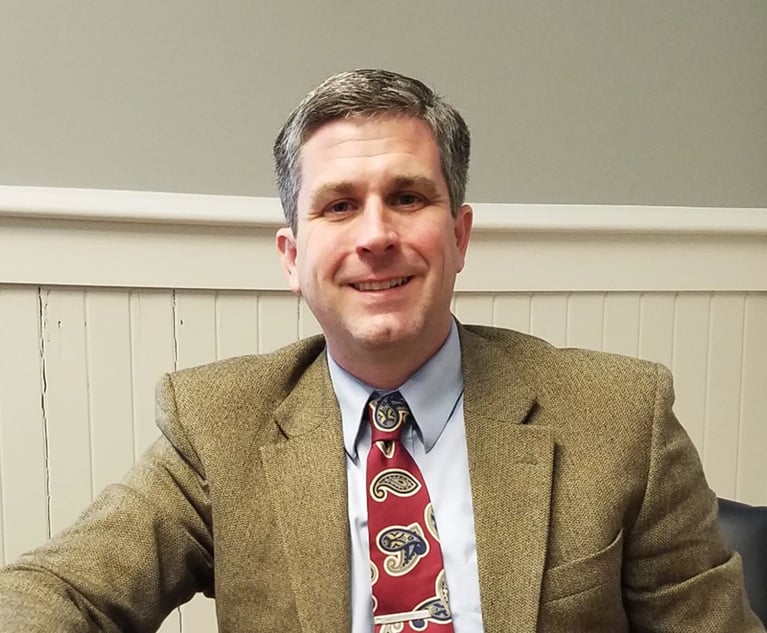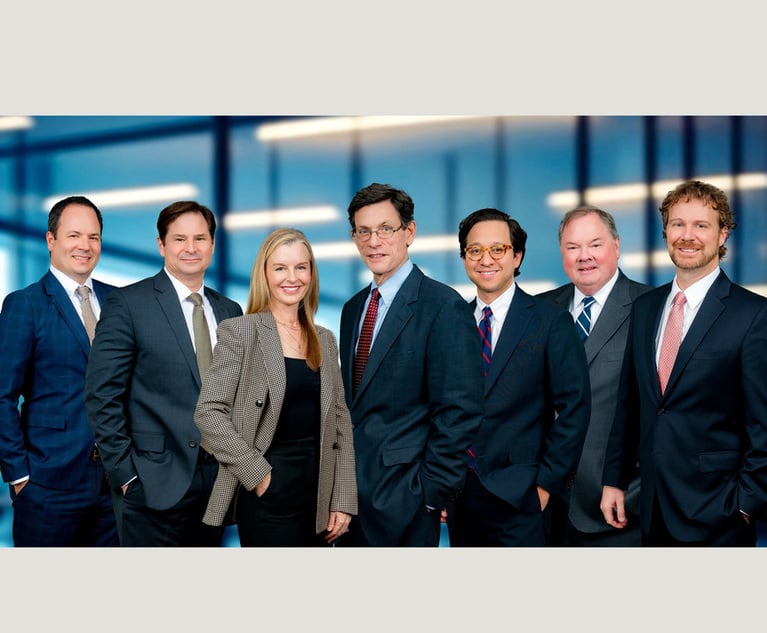SEC, ACC Are Defendants in Trial Over College Athletes' Compensation
A case with the potential to open the door for schools in top echelons of college football and men's and women's basketball to compensate student-athletes got underway Tuesday in a federal court in Oakland.
September 04, 2018 at 07:33 PM
4 minute read
The original version of this story was published on The Recorder
 National Collegiate Athletic Association headquarters in Indianapolis. (Photo: Shutterstock)
National Collegiate Athletic Association headquarters in Indianapolis. (Photo: Shutterstock)
The class-action lawsuit challenging the National Collegiate Athletic Association's limits on compensating student-athletes in top echelons of college football and men's and women's basketball got underway Tuesday in U.S. District Judge Claudia Wilken's courtroom in Oakland, California.
For a case with potentially dramatic consequences—especially for schools among the ACC, Big Ten, Big 12, Pac-12 and SEC, the “Power 5″ sports conferences to whom the plaintiffs want to shift the burden for setting limits of player compensation—the trial will be short on trial theater and heavy on technical details. Both sides made opening statements in the bench antitrust trial via filings lodged with the court in the run-up to Labor Day weekend.
The plaintiffs' team, which includes Hagens Berman Sobol Shapiro's Steve Berman, Winston & Strawn's Jeffrey Kessler and Bruce Simon of Pearson, Simon & Warshaw, fended off a defense attempt to knock the case out on summary judgment in March when Wilken found that they had produced “undisputed evidence” that student-athletes would be offered greater compensation and benefits during recruitment but for NCAA limits.
Wilken's ruling has left the NCAA's lawyers at Wilkinson Walsh + Eskovitz and Skadden, Arps, Slate, Meagher & Flom as well as the Pac-12's counsel at Proskauer Rose and the Big Ten's at Mayer Brown in a position where they must show that the limits on player compensation help drive consumer demand for college sports and create an atmosphere that helps college-athletes integrate into their school communities. Even if they carry that burden, defense counsel will have to show that those goals couldn't be achieved through less restrictive NCAA rules or rule-making by the individual conferences.
Court papers show that the Birmingham, Alabama-based SEC is represented by Robinson Bradshaw & Hinson of Charlotte, North Carolina and the Seifert Law Firm of San Francisco. The ACC, based in Greensboro, North Carolina, is represented by Smith Moore Leatherwood lawyers from Charlotte and Greensboro and by Holland & Knight's San Francisco office. The University of Georgia is in the SEC; Georgia Tech is in the ACC.
Wilken has set pretty strict ground rules for the 10-day bench trial that will play out in her courtroom off-and-on over the next month or so. Each side has 22 hours and 30 minutes to put on its case. Direct testimony has been filed with the court by declaration and cross-examination and follow-on questioning is being handled in open court. Tuesday's proceedings started with one of the plaintiffs' lead economic experts, Daniel Rascher, a professor and director of academic programs for the Sport Management Program at the University of San Francisco.
Proskauer's Bart Williams pressed Rascher to concede that amateurism does play into consumer demand for college sports and helps differentiate it from professional leagues. But Rascher said that any effect amateurism had on demand was “de minimis.”
“The anti-competitive harms outweigh any pro-competitive justification that I've seen,” Rascher said.
Williams, however, seemed to undermine a point that Rascher made in his expert report—that non-athletes at Stanford University who write for The Stanford Daily can earn money writing, editing and selling ads for paper. Williams pointed out that the Daily's website indicates that it has been independent from the school since 1973. Rascher said that his point in raising the paper was that other students can earn money while attending school, but he conceded that the fact that Stanford itself wasn't paying the students meant the example “doesn't go to that point as well as it would.”
But when Williams pressed a hypothetical that suspending the NCAA amateurism rules could lead some school to offer a prospective student-athlete $1 million—and potentially turn off fans drawn to its amateur nature—Rascher said that wasn't likely.
“They won't choose amounts that harm their own fan base,” said Rascher, adding that schools and conferences would act rationally in the wake of any change.
Jonathan Ringel of the Daily Report added the names of law firms for the SEC and ACC.
This content has been archived. It is available through our partners, LexisNexis® and Bloomberg Law.
To view this content, please continue to their sites.
Not a Lexis Subscriber?
Subscribe Now
Not a Bloomberg Law Subscriber?
Subscribe Now
NOT FOR REPRINT
© 2025 ALM Global, LLC, All Rights Reserved. Request academic re-use from www.copyright.com. All other uses, submit a request to [email protected]. For more information visit Asset & Logo Licensing.
You Might Like
View All
On The Move: Squire Patton Boggs, Akerman Among Four Firms Adding Atlanta Partners
7 minute read

Justice 'Weaponization Working Group' Will Examine Officials Who Investigated Trump, US AG Bondi Says

Trending Stories
- 1ACC CLO Survey Waves Warning Flags for Boards
- 2States Accuse Trump of Thwarting Court's Funding Restoration Order
- 3Microsoft Becomes Latest Tech Company to Face Claims of Stealing Marketing Commissions From Influencers
- 4Coral Gables Attorney Busted for Stalking Lawyer
- 5Trump's DOJ Delays Releasing Jan. 6 FBI Agents List Under Consent Order
Who Got The Work
J. Brugh Lower of Gibbons has entered an appearance for industrial equipment supplier Devco Corporation in a pending trademark infringement lawsuit. The suit, accusing the defendant of selling knock-off Graco products, was filed Dec. 18 in New Jersey District Court by Rivkin Radler on behalf of Graco Inc. and Graco Minnesota. The case, assigned to U.S. District Judge Zahid N. Quraishi, is 3:24-cv-11294, Graco Inc. et al v. Devco Corporation.
Who Got The Work
Rebecca Maller-Stein and Kent A. Yalowitz of Arnold & Porter Kaye Scholer have entered their appearances for Hanaco Venture Capital and its executives, Lior Prosor and David Frankel, in a pending securities lawsuit. The action, filed on Dec. 24 in New York Southern District Court by Zell, Aron & Co. on behalf of Goldeneye Advisors, accuses the defendants of negligently and fraudulently managing the plaintiff's $1 million investment. The case, assigned to U.S. District Judge Vernon S. Broderick, is 1:24-cv-09918, Goldeneye Advisors, LLC v. Hanaco Venture Capital, Ltd. et al.
Who Got The Work
Attorneys from A&O Shearman has stepped in as defense counsel for Toronto-Dominion Bank and other defendants in a pending securities class action. The suit, filed Dec. 11 in New York Southern District Court by Bleichmar Fonti & Auld, accuses the defendants of concealing the bank's 'pervasive' deficiencies in regards to its compliance with the Bank Secrecy Act and the quality of its anti-money laundering controls. The case, assigned to U.S. District Judge Arun Subramanian, is 1:24-cv-09445, Gonzalez v. The Toronto-Dominion Bank et al.
Who Got The Work
Crown Castle International, a Pennsylvania company providing shared communications infrastructure, has turned to Luke D. Wolf of Gordon Rees Scully Mansukhani to fend off a pending breach-of-contract lawsuit. The court action, filed Nov. 25 in Michigan Eastern District Court by Hooper Hathaway PC on behalf of The Town Residences LLC, accuses Crown Castle of failing to transfer approximately $30,000 in utility payments from T-Mobile in breach of a roof-top lease and assignment agreement. The case, assigned to U.S. District Judge Susan K. Declercq, is 2:24-cv-13131, The Town Residences LLC v. T-Mobile US, Inc. et al.
Who Got The Work
Wilfred P. Coronato and Daniel M. Schwartz of McCarter & English have stepped in as defense counsel to Electrolux Home Products Inc. in a pending product liability lawsuit. The court action, filed Nov. 26 in New York Eastern District Court by Poulos Lopiccolo PC and Nagel Rice LLP on behalf of David Stern, alleges that the defendant's refrigerators’ drawers and shelving repeatedly break and fall apart within months after purchase. The case, assigned to U.S. District Judge Joan M. Azrack, is 2:24-cv-08204, Stern v. Electrolux Home Products, Inc.
Featured Firms
Law Offices of Gary Martin Hays & Associates, P.C.
(470) 294-1674
Law Offices of Mark E. Salomone
(857) 444-6468
Smith & Hassler
(713) 739-1250






